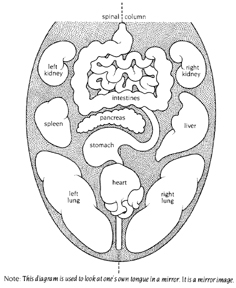 The ancient art of tongue diagnosis also describes quite characteristic patterns that can reveal the functional status of respective internal organs merely by observing the surface of the tongue. The tongue is the mirror of the viscera.
The ancient art of tongue diagnosis also describes quite characteristic patterns that can reveal the functional status of respective internal organs merely by observing the surface of the tongue. The tongue is the mirror of the viscera.
A discoloration and /or sensitivity of a particular area of the tongue indicates a disorder in the organ corresponding to that area. A whitish tongue indicates a kapha derangement and mucus accumulation; a red or yellow-green tongue indicates a pitta derangement; and a black to brown coloration indicates a vata derangement. A dehydrated tongue is symptomatic of a decrease in the rasa dhatu (plasma), while a pale tongue indicates a decrease in the rakta dhatu (red blood cells).
The front one-third of the tongue relates to the lungs, heart, chest, and neck. Froth in the middle of this area is often a sign of low lung energy with damp and cold lungs and may translate as a cold, bronchitis, asthma, or respiratory allergy. If there is a small depression in the heart area, it often relates to intense grief, sadness, or depression.
The central third of the tongue relates to the liver, spleen, stomach, and pancreas. Small ulcers on the tongue in the stomach area may reflect gastritis or peptic ulcer.
The rear one-third area of the tongue relates to the lower abdominal organs, such as the small intestine and colon. If this posterior part of the tongue is covered with coating, that is ama or toxins in the colon, indicating low colon energy.
Cleansing the Tongue
One of the best ways to keep the tongue healthy is by scraping it daily. This removes overnight build-up of bacteria and toxins on the tongue. Rather than brushing the tongue, which will only push bacteria and toxins into the tongue, this is done with a tongue scraper or spoon. To do this, extend the tongue and place the scraper as far back on the tongue as comfortable.
Using one long stroke, gently pull the scraper forward so that it removes the unwanted coating on the tongue. Rinse the scraper and begin again if necessary. Ayurveda says that scraping the tongue should only be done in the morning on an empty stomach. Scraping the tongue is a good way to start to observe the tongue and as a result, the health of the internal organs.

Vasant Lad BAM&S, MASc
A native of India, he served for three years as Medical Director of the Ayurveda Hospital in Pune, India. He was Professor of Clinical Medicine at the Pune University College of Ayurvedic Medicine for 15 years. He holds a Bachelor’s of Ayurvedic Medicine and Surgery (BAM&S) degree from the University of Pune and a Master’s of Ayurvedic Science (MASc) degree from Tilak Ayurved Mahavidyalaya. The author of numerous books, Vasant Lad is respected throughout the world for his knowledge of Ayurveda.





